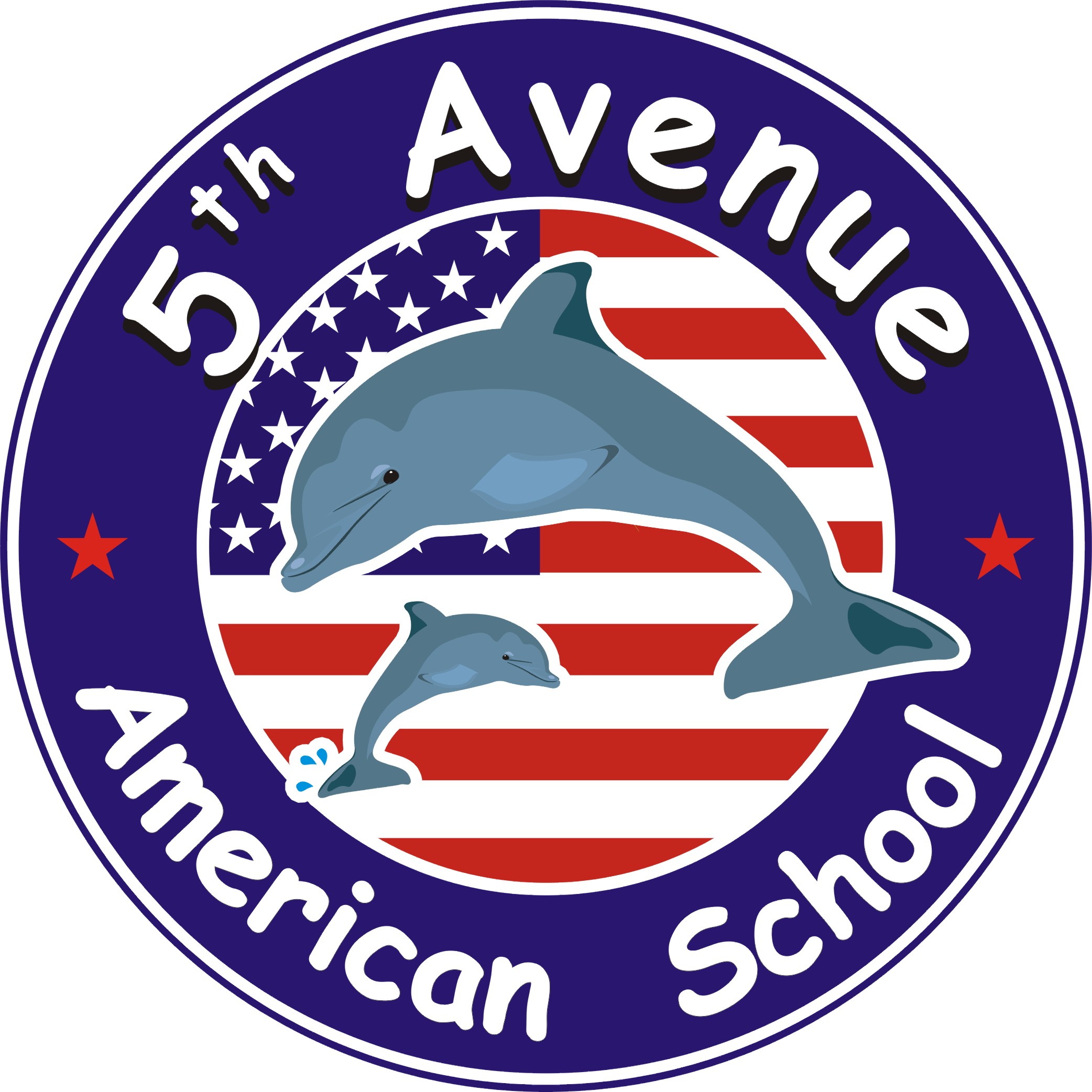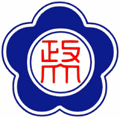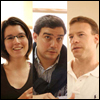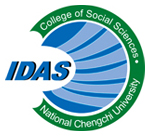National Chengchi University All-English IDAS, IMAS Degrees 亞太研究英語博士學位學程 IDAS, 亞太研究英語碩士學位學程 IMAS
Contact Information
Tel: 886-2-29393091
Email: www@nccu.edu.tw
Address: NO.64, Sec.2, ZhiNan Rd., Wenshan District, Taipei City 台北市文山區指南路二段64號
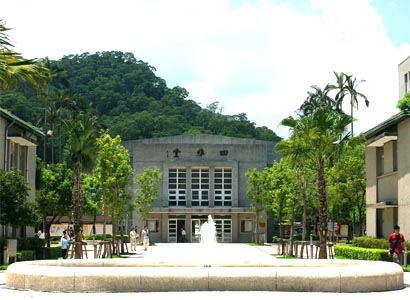
The all-English Master's & Doctoral Degrees in Asia Studiesoffered by National Chengchi University are a really incredible opportunity. Taiwan sits at the intersection of vast range of leading international issues – Cross-Strait Relations, Conflict Resolution, Restive Internal Populations Contending For Rights, Tarrifs & Trade, Special Economic Zones, Agricultural Economies Hurtling Into Industrial Economies, Deforestation, Rapid Urbanization, Women’s Rights, Agricultural Issues, Revanchism, Irredentism, Authoritarianism vs. Democracy, Press Freedom, Demilitarized Zones, Regional Peace and Great Power Politics.
At the vanguard of the latest research in every one of these areas are the professors of National Chengchi University. How well-recognized? So well-recognized that NCCU has just been selected by the John D. and Catherine T. MacArthur Foundation as the home for the MacArthur Center for Security Studies as part of its Asia Security Initiative.
This is the strength of the program for international students: you can take an all-English Master’s or Ph.D. and focus on any one of these areas of inquiry which are set to remain at the forefront of international importance for the next several decades in the region where the issues are actively in play, as well as gaining the opportunity to master Chinese.
IDAS – International Doctoral Program in Asia-Pacific Studies
-
Established in 2008
-
1st Asia-Pacific Studies Ph.D taught entirely in English in Taiwan
-
Allows specialization in any of the countries in the Asia-Pacific
-
Multi-cultural student body hailing from over 17 countries
-
Remains the only Asia-Pacific Studies Master’s degree taught entirely in English in Taiwan
-
Contact: Angel Li, idas@nccu.edu.tw, 02-2939-3091 ext.51278
IMAS – International Master’s Program in Asia-Pacific Studies
-
Established in 2003
-
1st Asia-Pacific Studies Master’s degree taught entirely in English in Taiwan
-
Multi-cultural student body hailing from over 32 countries
-
Remains the only Asia-Pacific Studies Master’s degree taught entirely in English in Taiwan
-
Grace Tsao, imas@nccu.edu.tw, 02-2939-3091 ext.51255
In addition to the MacArthur Center, NCCU’s Institute for International Relations offers both Master’s and Doctoral students the opportunity to refine their skills – the opportunity to apply their statistical and inquiry models to professors’ ongoing research on real issues as paid research assistants, and the chance to stake out claims for their own theories with the platform that the university offers.
As different centers of gravity open across Asia - reorienting everything from resource allocation to currency valuation and conflict resolution - the need for governments, think tanks, universities and businesses to have concrete insight into each of these areas increases every day. NCCU’s all-English Master’s and Doctoral programs in Asia Studies are an incredible opportunity to take a leading position in the field of your choice.
Established in 1927
|
Students Total: 15,167Undergraduates: 9,052 Master students: 3,257 On-the-job Master students: 1946 Ph. D. students: 912 International Students: 405 |
Faculty Total: 635Professors: 280 Associate professors: 203 Assistant professors: 107 Lecturers: 45 Domestic Faculty: 608 Foreign Faculty: 27 |
|
Partner Universities Total: 136University level: 75 College level: 61 |
Exchange Students In-coming exchange students: 91Out-going exchange students: 169
|
Students Aaron Jensen 張愛龍, Sabrina Habich 李永雯 & Juan Quintana 吳華安
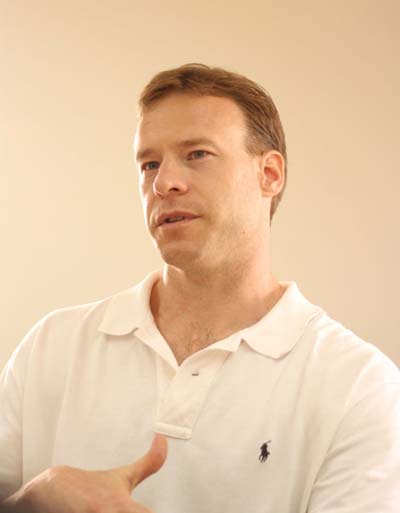
Aaron: Before I came here I was in the United States Air Force and I left but I wanted to do something related to, you know, maybe, politics or the international environment.
Politics – but what was your background before. Just Air Force?
Yeah, military background. I also studied Asian studies for my undergraduate major and I focused mostly on China but I have an interest both in China and Taiwan and in the east Asia region in general. But, a program like this – to get a master’s degree from a foreign university and to be able to get a different perspective is a valuable thing and I think it counts for quite a bit in the United States right now. Think tanks, government, businesses – a lot of people I think would be interested in someone with this kind of background. So, that was my motivation. Hopefully, it will pay off. And, the Chinese language as well.
Because you mentioned politics I just thought maybe your family, or your cousin some kind of relationship with that.
No. Just me
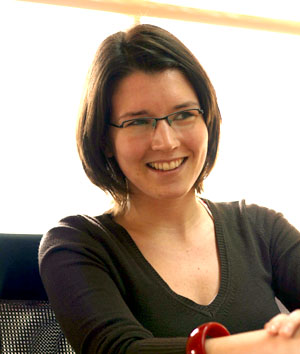
Sabrina: I studied also Chinese studies before in Germany. My…I did a master’s. Or, in German it’s called “Magister” – it’s similar to a master’s degree. And, actually the program was called Sinology so it was based on Chinese literature and culture and language. And, I also did an exchange before to Beijing, but only for half a year, so I always wanted to, after my studies, I wanted…
Which school did you study at in Beijing?
Bei Da, PeKing University 北京大學
What program did you study?
It was an exchange program organized by our university in Germany. So, basically, it was called European Center for Chinese studies… It’s a one-semester program where you go abroad and deepen your language knowledge, yeah...
So, I always wanted to go back but, and, yeah, and I knew that I wanted to do a PhD and a professor in – from Austria, actually, a professor that I know recommended this program here. So…
Why? They had been here before or they had worked with other professors here before?
She knows the university and said that NCCU is a very good university and also because it’s a new program and an English language program and I personally didn’t know if I would be able to study in a Chinese-speaking program. I was too afraid, although I can speak Chinese but I didn’t know if it would be enough. So, for me, that was an incentive as well to choose this program because it’s English-speaking.
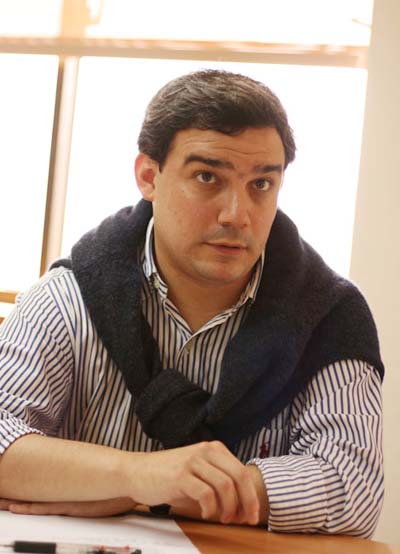
Juan: I’m a lawyer by training. I attended law school in Argentina. I’m from Argentina. I left Argentina and studied in the US. I studied in Georgetown: Public Policy. And when I was working in, still in Washington – I was working in the U.S. senate while they were discussing China’s admission to WTO so I started to be interested…in 2000…so I became interested in China studies. And, when I went back to Argentina I started studying Chinese there and I decided to come to Asia because I thought that I was going to improve orally if I was in a mandarin Chinese-speaking environment. So, first I came here in 2004 and I studied in Shi Da 國立臺灣師範大學
Chinese?
Chinese.
And, then, I went back to Argentina and decided to come back to Taiwan and I enrolled in a master’s program in Chen Da called中國大陸研究所 – a master in China studies.
Is that the same program in Aaron is studying in today?
Aaron: Sister program.
Juan: They changed the name. Now it’s called Master In Asia-Pacific Studies. And when I was enrolled in that program before graduation I became a teaching assistant of International Law & China and after graduating…
Which school were you teaching in?
The Department of Diplomacy, here.
I mean – you were teaching here?
I was a teaching assistant here, in Chien Da, in the Department of Diplomacy.
You were also a kind of lecturer?
I do have the certificate of lecturer by the Ministry of Education here because I’m, part-time, I’m a student and also I’m teaching…
So, you are also a lao shu here?
Yes, but not in Chen Da - in Banchaio.
So, Chen Da has another branch?
No, no, no. There’s another institute, that after I graduated from my masters they hired me to teach there.
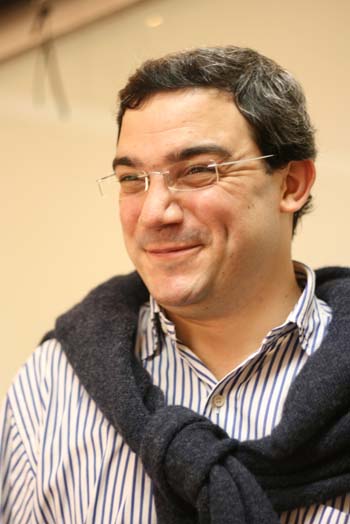
What’s the school’s name?
It’s 致理技術學院. (Chihlee Institute of Technology)
The department?
You must be so popular?!
I’m popular because I’m the only foreigner. It’s a very, very interesting experience teaching there.
So, you teach in Chinese or in English?
I try my best to teach in Chinese but, unfortunately, my Chinese is not good enough so I have to use English.
What do you think – the students can understand you?
Of course it’s – we have a language barrier and culture barrier, but it’s improving. And, I’ve been there, I’ve been teaching there for over a year and it gets better and better.
Impressive!
Not really.
Good for them. Good for the students here.
Besides studying here with Sabrina in the IDAS program I’m also working in the Institute of International Relations in Chen Da.
My next question is so far what have you learned? You have learned pretty much like three years four years already. And what subjects have impressed you the most?
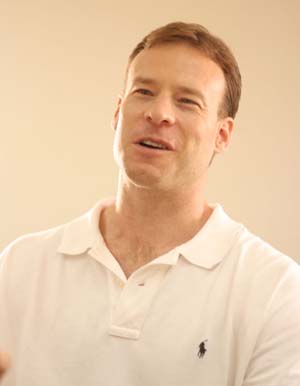
 Think tanks, government, businesses – a lot of people I think would be interested in someone with this kind of background.
Think tanks, government, businesses – a lot of people I think would be interested in someone with this kind of background. 
Aaron: I think one of the strengths here that the school has is the Institute of International Relations and the conferences that they hold – that’s a good thing. And they have a lot of contact with mainland China…
http://iir.nccu.edu.tw/english_web/
http://iir.nccu.edu.tw/english_web/iirannounce.htm
What kind of contact?
They have a lot of visiting scholars from mainland China and they go there all the time they’re into, you know, the Tai Shang and all that and some professors do a good job of capitalizing – they could do more, I think, especially when it comes to China. But, they do have some good lectures up there – not a lot of people know about that but I have taken advantage of that. You know, the quality – it’s really: it all comes down to which professor and what kind of experience they have. And, some of them do have a lot of insight and others could do a little bit better job. But, you know, Taiwanese politics – I’ve learned quite a bit more, that’s a difficult subject to get into. China, I’d like to get a little bit more out of that but, yeah, I’ve had…there’s some strengths and some weaknesses in the program…
But, which subjects have impressed you the most? And, what did you think about those subjects?
Well, see, I’ve seen strengths in different areas. Like, politics: some professors, some areas in politics are good. Some in cross strait relations. Professor Yen I Yuan 袁易does a lot with theory – and, I didn’t like theory before I came; and, I’m not a big fan of theory but – that’s his strength and he did a fairly good job with tying theory in with, I think, with what’s going on now. Professor Liu Fu Gwo Fu-Kuo Liu 劉復國 with his focus on security – you know, I know about China and Taiwan to a certain extent that he does a lot with the whole region. So, I’ve been able to get a little bit more out of what’s going on in Asia. So, those are some examples for me.
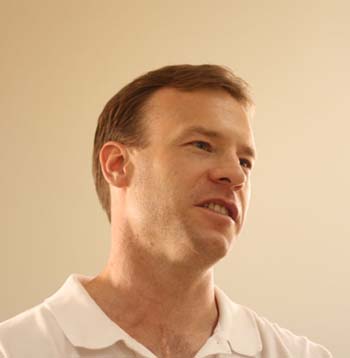
I have a question, one question for you Aaron – your background is quite interesting because you were an Air Force…
Yeah, in the military…
So, just curious what’s the relationship you’ve come to Taiwan to study this program and your Air Force background?
Well, see, even when I was in the Air Force I wanted to deal with Asia – but, I didn’t really get to do that as much as I wanted to.
Were you sent in Asia before?
No, no. I was stationed in Japan for a little while and that was…
Never been in greater China?
Oh, I made visits.
I know the U.S. Air Force sends you everywhere
Well, not quite everywhere but…
My brother is in the military. So I’m just curious your background to study this…
I’ve always had an interest… Well, since college I’ve had an interest in Asia and I thought – one of my ideas in going into the Air Force was to use that as a springboard for other things. Because, if you do that, you know, companies, the government, think tanks – they all see that as valuable experience and I was hoping to get more Asia experience when I was in the military although it was a different part of Asia then I wanted to be in: the Middle East not East Asia so much. But, and I decided: my experience in the Air Force wasn’t really going exactly where I wanted to go. But, when I saw what else was out there, you know – think tanks, the government, civil servants and businesses who have contacts with Asia: a lot of people who go into the military, they get out and they go into think tanks or business or Government. And, I realized that “Hey! It’s good that I have military experience, but I need another advantage.” And, to get a degree from, you know, and Asian University is something unique and, you know, I mean the depth of the program here – that’s something: the professors, especially for Taiwan, I mean this is only, the only Taiwan studies program – or it was, before they changed the name. I mean, I think, Oxford or London or something – you know one of those schools they have kind of a Taiwan program but, I mean, if you want to learn about Taiwan or Asia then you want to come to Asia and so that’s really, you know, for those reasons I decided to come to this program. And, because, of course it is a Chinese, Chinese environment – Chinese-speaking environment. See, we can study here and, on the side, I think a lot of us we continue to learn Chinese. In fact, right now, I don’t have any more classes in my program but what I do is I sit in on regular graduate programs and just listen, just to build my listening skills and I do get, I get a fair amount out of them. You know, I can’t understand everything but it’s still, you know, I still get, you know, different perspectives coming from professors and students about Asia or the United States. In fact, I think they talk about the United States too much – some more time talking about Taiwan & China so I can know their, you know… But, so, you know that’s kind of another strength – it’s really not an official part of the program but you can do that when you’re here
Sabrina: The question was about the strengths of the program?
Juan: What have you learned.
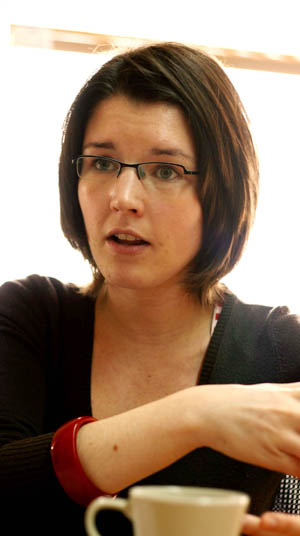
 And, this is very important for me to have some theoretical base from which I can further develop my thesis. So, this is one strengths of the program because I think that the professors here...are very good and...teaching these things that I need.
And, this is very important for me to have some theoretical base from which I can further develop my thesis. So, this is one strengths of the program because I think that the professors here...are very good and...teaching these things that I need. 
Sabrina: Well, for me…
Sorry — before you studied in this PhD program so you were in?
Sabrina: Chinese studies, sinology.
Where did you get your master’s degree?
In Germany in – the city’s called Würzburg …
So, this is your first time in Taiwan?
Sabrina: Yeah, it’s my first time in Taiwan and for me it was, like, the courses that I take now they’re focused pretty much, sometimes, part of them, are focused on economics or also politics or social development. Because I’m very interested in development studies, so I’m taking more the development studies classes. And, this is very important for me to have some theoretical base from which I can further develop my thesis. So, this is one strength of the program because I think that the professors here – maybe also in, probably also in other schools but, because I’m here now – I know that the professors are very good and, yeah, just teaching these things that I need. For example, development studies and development studies in Asia [which are] very important for me and I like this.
So which class…?
Classes? I’m taking classes now. I’m now taking the second class of the development studies. I mean I took three classes last semester – two were on development studies and one was about Asia Pacific development, Asia-Pacific regional development… This was last semester. And now I’m taking research methods…and political development.
Which country? Taiwan’s political development? Or Asia?
Asia; first we are doing the basics, like theories in general and then we’re going to focus on China, Taiwan, Korea and…
Sounds deep! What have you learned so far?
We only had one class so far so we just talked about, like, the class and syllabus so far. But, what I like about this course and also the one that I took in social development – because they are kind of related political development and social development – that first, we have the basics about all of the most important theories and then we are going to talk about China, Taiwan and, for example, Korea or japan so the Asian perspective and I think this is very good, in general, this program.
What do you think about the programs? You can also talk about some of your master studies experience.
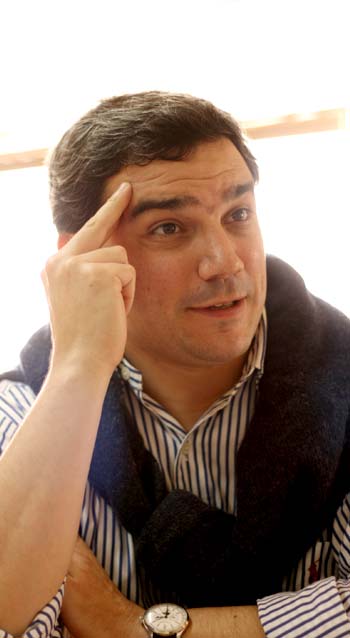
 there is a lot of academic exchanges between Taiwan and mainland China: people from Shanghai, from Beijing, from Hong Kong but also from Asia in general
there is a lot of academic exchanges between Taiwan and mainland China: people from Shanghai, from Beijing, from Hong Kong but also from Asia in general 
Juan: Sure, sure. But, if you prefer, I can go back to your original question that was what have we learned in Taiwan. I have learned not only in the school – I have learned a lot because, as Aaron mentioned, there is a lot of academic exchanges between Taiwan and mainland China: people from Shanghai, from Beijing, from Hong Kong but also from Asia in general – you have people from India, people from Singapore, visiting scholars from Malaysia, from Indonesia – it’s very interesting. But, just the fact of being here I learn every day. Not only in the school but also in my everyday relations with my neighbors with my friends with my classmates – it’s unbelievable! For me, it’s…we have such a big culture gap that I learn every single day. We have 尾牙 we have 小過年…
You know 尾牙?!
I didn’t before coming here. But, it’s very interesting. I never stop learning. Not only in the classes, I mean, the library or in the institute but outside. It’s fantastic, it is! It’s a very, very good opportunity for me to learn a little bit more about such a huge region that I don’t know much about.
I’m just curious you’ve been in Taiwan since like – at least four years – and you know…
I think four years, yes, all together.
Yes. You been in Taiwan for a long time, so you also know there is NTU and some other kinds of universities. Why did you stay, still stay in NCCU? What motivated you to stay in the school? Why did you choose Chen Da?
It has originally to do with the programs that this university was offering…
Also sorry I have one more question for you to think about: why didn’t you choose China?
When I was coming here to Asia, because the only way I was going to get some proficiency in mandarin Chinese was being in Asia. So I said “OK. I have two options: I can either go to mainland China or I can come here.” The year I decided to come was the first time when胡錦濤 (Hu Jintao) was going to South America – visiting Brazil Argentina and Chile.
What year?
2004. It was not s 胡錦濤’s (Hu Jintao’s) first visit to South America but it was the first one…
Where were you at that time?
I was in Argentina. And, then I decided to come here before the Chinese president visited and the good thing was that it was the first time that the Taipei office in Argentina offered scholarships to Argentine students.
Taiwan scholarship?
Taiwan scholarships, exactly.
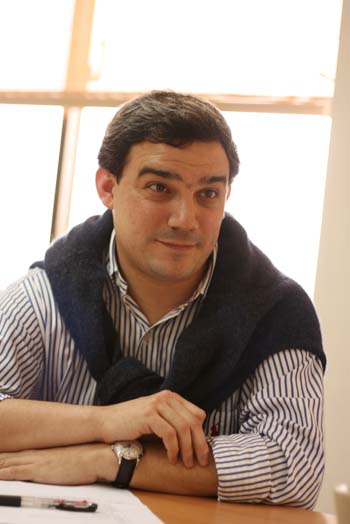
30,000 NT dollars a month?
Not so much because those are from 外交部 but I had from ministry of education, so it was 25,000.
Not too bad.
It was fantastic! For a scholarship? It was fantastic! ... And, actually, I also got other scholarships from universities in China but Taiwan was more money and it was more convenient.
What kind of convenient? Can you tell us some details?
Everyday life. You have big cities here but you don’t have, like, huge megalopolises like Shang Hai or Bejing with millions of people in there. I think that here, in Taipei, you don’t have more than, in the greater Taipei area, you don’t have more than six million people. Which is less than 1/3 Shan high, for example.
So you mean the population is not that many so…
Less people is less problems, yes. Especially, because, in my country we only have forty, not even forty million – thirty-seven million – so we are not used to big cities. … And the good thing about Chen Da was they were offering English-taught programs focused…
The other universities weren’t offering that?
It’s not only one factor. It’s – they were offering the programs I was looking for and they had the 國際關係研究中心 (Institute of International Relations) – that is where I work, because I only had the scholarship for two years. And, the third thing is that they have the third largest library in Asia – Chen Da. So…
You already researched that?
It was in the China Post a couple of years ago. Or, three years ago it was – Chen Da has the largest library in Taiwan and is the third one in Asia. So, the possibilities of doing research here are huge.
Sabrina: it’s even bigger than the one in…
Juan: Tai Da, yeah, it is. Sabrina: Tai da?
Juan: And, Academica Sinca as well. I’m not sure all the – the number of volumes but they have, and it’s…
Anything else?
Juan: That’s it. It was many different factors that [brought] me here.
So, even though after two years masters’ study you still decided to stay here?
Sure, because immediately after graduating I was offered a job in 國際關係研究中心 in the Institute of International Relations.
So, as a kind of researcher?
Exactly.
So, after you graduated you already had a job here?
I have two. I have this one in the Institute of International Relations and the other one in 致理技術學院(Chihlee Institute of Technology).
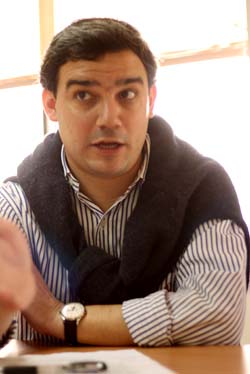
So, when did you start teaching?
Over a year ago. And I’ve been…
2008?
2008, um hm.
So, 2008 summertime – its September?
Sure. But, before that I was a teaching assistant of 國際法 (International Law) here in the Department of Diplomacy.
So, you are teaching in two different schools right now? NCCU and 致理技術學院(Chihlee Institute of Technology)?
I do research in NCCU and I teach in致理技術學院(Chihlee Institute of Technology).
But you said 國際法 (International Law) – you’re teaching here?
Yes, but I…at that time, in 2008. I’m not teaching 國際法 (International Law) anymore.
One semester or one year?
One year.
But not anymore?
Not anymore. I don’t have that much time. It’s very interesting but I don’t have much time.
Don’t worry. After you get your PhD you’ll get so many classes!
I hope. Thank you.
You will. You’ll probably been teaching here; as an assistant professor. Are they already talking to you about that?
That’s related to… You ask me why did I choose Taiwan. I said this question number eight. And then you’re asking what you want to do with your degree in question number 11 and it’s: “I want to become a professor.” That’s pretty much my track.
And you, Aaron? What do you hope to do with your degree?
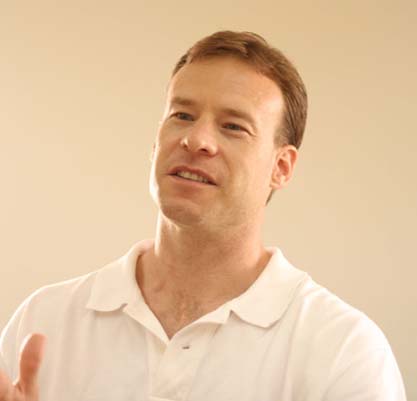
 ...these professors, you know, rotate in and out of government, so they have that experience and all the conferences here and the institute.
...these professors, you know, rotate in and out of government, so they have that experience and all the conferences here and the institute.
Aaron: I think it would be nice if I could be in government or a think tank looking at political security issues. Probably based in the United States but, you know, it would be nice if I can come back to Taiwan for some visits and use this as an advantage…
國際關係研究中心(The Institute of International Relations)… you should think about that!
Yeah, yeah… That’s, that’s a good thing. One thing I will say about coming to Taiwan vs. mainland China: I hadn’t looked at programs in mainland China – they have the Hopkins Nanjing program, which, is, I think, pretty well-respected. But, after I look to the price I kind of said “Well, you know, that’s just, just too much.”
What was the price?
Juan: It’s very expensive
Aaron: Yeah. It’s pretty high.
You mean studying in China?
Aaron: Hopkins Nanjing – it’s this…a collaborative program between the Johns Hopkins university in the United States and Nanjing university. And, so, the price is too high for mainland China
I know they charge you a foreign students so much. Probably like 10 times local students.
The problem is I don’t think that they have developed that into an actual degree program yet. So, it’s good that you can take classes in Chinese and learn about China, but if you don’t have a degree that a limitation. And the other thing, I think, China is opening a lot but I’m sure some subjects are still limited, & you’re going to have political overtones and you got to be careful about what you talk about, so.
Sabrina: yeah.
Juan: Plus, the limitation that you cannot use the Internet freely.
Yeah. Probably that, too. But, that’s the thing, is, you know, if you have a China, a China studies master’s program here I think it’s still valuable. You put a name “China” on a masters degree I think for a lot of Americans it’s going to count for, you know, it’s going to count for a lot. And, you have enough professors here, you know: same language; they can understand China; they go to China; they do the research – you know in Tai Shang they have all that. So, in that respect, I think that’s still a valuable, still a valuable thing for NCCU.
So, I am also interested in why you chose NCCU.
It’s the only school then I saw with a program…I did notice that some other schools around Taiwan have various types of master’s programs but, you know, this school it has the Department of Diplomacy – the politics – these professors, you know, rotate in and out of government, so they have that experience and all the conferences here and the institute. So, it all adds up. I think it, for politics and international relations it’s probably better, even, than Tai Da would be my guess. I’ve had friends at Tai Da who say that “You know, [NCCU] has a lot good things going for it.” So, it’s just a combination of factors.
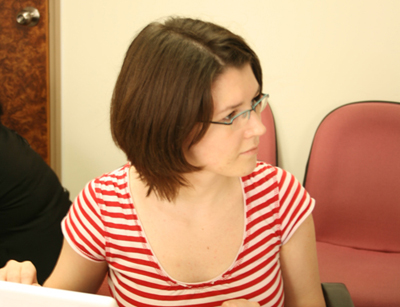
 I’ve been to mainland China; I lived in Hong Kong before for a year. I’ve been to Singapore and Malaysia and Indonesia...
I’ve been to mainland China; I lived in Hong Kong before for a year. I’ve been to Singapore and Malaysia and Indonesia...
Sabrina: Why I chose NCCU?
I know why you chose but I mean after you got this degree what do you intend to do?
Sabrina: I’m either going to choose… Well, it depends. I want to work in development, in the development field. So, either I’m going to – I want to work for a development agency in the nonprofit sector. Or, I’m going to – it depends on what I can get – or I’m going…. Teaching track: to become a professor. So, either one of the two. I enjoy doing research. So, that would be a possibility as well.
I always believe if you study for a PhD you definitely want to teach – that’s why you study so much.
Yes. First, we need to get…because so far I don’t have that much teaching experience. I taught in Germany before at university.
What did you teach?
China studies, in my program.
What kind of topics? What did you tell your students about China?
Well, it was… the topic was on arts and transformation and how art in China is influenced by politics. That was basically the topic of the seminar. And, but, that’s the only seminar I’ve taught so far. So, I need to get teaching experience here as well if I want to continue teaching later, I think.
Because now we are all in Taiwan what’s the difference how has your expectations before you arrived met with the reality of things here? One is the Taiwan issue. One is the NCCU issue.
Sabrina: Well, I think it’s difficult because what I knew before was that Taiwan, because it’s the first time that I’m in Taiwan…
Before that have you been in Asia before?
Yes.
Which countries?
I’ve been to mainland China; I lived in Hong Kong before for a year. I’ve been to Singapore and Malaysia and Indonesia…
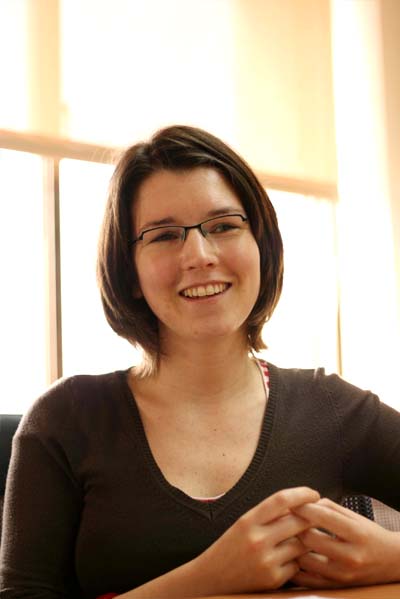
So you are in Hong Kong for year? What were you doing there?
Studying – it was in high school. I was, yeah, when I was 16 I was there for a year. Indonesia, Singapore and Malaysia – I’ve been there as well. So, but when I knew about Taiwan before was that it’s freer, a lot more free... like the thinking and everything…. And, that the people here are…friendly…. So, when I came here I didn’t experience great surprises about Taiwan because what I heard before pretty much corresponds to the things that I experienced here.
And, about NCCU: it is better than I thought, actually, the university. Juan mentioned the library and I…if… I know here it’s the third largest in Asia? In Asia even?
Juan: Yeah.
So, I really enjoy studying in the library and doing research here because I have access to so much, yeah, information and journals and books. And, what I also enjoy, is all the conferences here – what Aaron also just mentioned. Not only the conferences here the university and the visiting scholars and the Institute of International Relations but also in Taipei in general – there’s so much going on regarding research that this is very convenient that you’re here. Also, it’s a small country but, and we’re in the capital and it’s, yeah, easier to explore things about the country when you’re in the capital. So, yeah, actually the study part is better than I expected.
Really?
Yeah.
Can you explain that?
Well, first, what I just mentioned – the library, then I have access to so much journals, books and everything. And, also, my courses here. Because, in Germany there were some people telling me “Well, you have to be afraid. Maybe some of the professors here in English and might not be as good as you expect.”
Really?
Yes. They mentioned it.
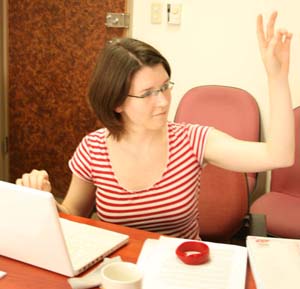
Who mentioned it?
Professors at my university.
So they had been here before?
Yeah.
So they did talk to some professors from Taiwan?
But not from this program.
I see. So then, that time, you also would have been led to think…
Yeah. I wasn’t that much worried about it because it cannot be that it’s an English program and the professors’ English is not good. And, it’s, also, not true; and their English is good and I can understand everything in – it’s just fine.
Your professor will be very happy to hear that!
Yeah, I already told them. I mean, I told my professors in Germany – also because the asked me.
Change your stereotype. No. Not true in my program!
Laughs

 Taiwanese professionals, these kind of classmates. And, when we socialize outside of class, we get to know them. You know, you can meet people in the government, in business
Taiwanese professionals, these kind of classmates. And, when we socialize outside of class, we get to know them. You know, you can meet people in the government, in business 
Aaron: I think since I’ve been here in the past few years – you just learn more about the details of life in Taiwan, its political system, its relation with mainland China. I had been here several times before and, in fact, I first came here because of a Taiwanese girlfriend who I had in the States and through her and through the travels she gave me kind of an introduction to Taiwan. So, I think just some of the basic things I was aware of. But, one thing I think Taiwan, or that I’ve kind of noticed is that Taiwan is a lot closer, I think, to mainland China that I first realized, culturally. Certainly, with the amount of people there. There are the businessman and the political atmosphere right now. A lot of that’s changed recently; that kind of surprised me. And, you know, there’s other things about Taiwan society which you discover after you’ve been here for a while. Some people are, you know, very proud of Taiwan and others are not as proud of Taiwan as you might expect them to be – and that’s just my view on things.
Specifics, please.
Well, I remember I was in a class, one of our classes here, and there was a kind of middle-aged Taiwanese man and he asked me what I was doing here. I just kind of told him, “Yeah. I am here for the program.” “Why didn’t you just go to China; why did you come here?”
And other people express thoughts and sentiments that they think Taiwan will decline or that, you know, it’s kind of, kind of a backwater and, you know, it’s not Paris or Tokyo or New York. But, I mean, you know, I think maybe it’s this – what do you say – a kind of a little bit lack of self confidence, you know. It’s unfortunate, because what Taiwan has done in the past few decades is amazing and one of the important things, you know, you look at…people in the United States are concerned about democratizing well, sometimes democratizing, other countries. Well, if you want to see how that’s done you should come to Taiwan and look at Taiwan’s long process. You know, because it’s a success story. So, in terms of development looking at the challenges Taiwan has a lot to offer people who want to study in that area. Who, you know – you look it Iraq, Afghanistan: it’s a mess, you know. And Taiwan is kind of a best case example. So, I think from that respect, you know, there’s a lot you can look at in Taiwan’s history, its economic development, its political and social development, so.
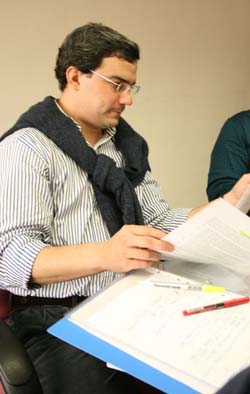
 there is a lot of academic exchanges between Taiwan and mainland China: people from Shanghai, from Beijing, from Hong Kong but also from Asia in general
there is a lot of academic exchanges between Taiwan and mainland China: people from Shanghai, from Beijing, from Hong Kong but also from Asia in general 
Juan: What surprises me about Taiwan and what I was expecting too… before and after and NCCU?
Well, most of the things I have…I had a… my first Chinese teacher, in Argentina, was Taiwanese and she gave me…
So she’s really from Taiwan?
She’s Taiwanese, uhm hm. Born and raised in Taiwan.
So she told you a lot of things?
She told me of course a lot of things.
The first references I had about Taiwan, of course, were from the books – you know, was first I was reading about Taiwan, about China – about history, about political relations across the Strait. And, the first…the first kind of the experience I had, I ever had with Taiwanese people was, of course, in Argentina with either my Taiwanese mother and Chinese professor or the people from the Taipei office in Argentina. And, they said “Maybe you’re going to be surprised because Taiwan is not exactly what you are expecting. Forget about big, empty spaces. Forget about big, empty parks where you can play football, were you can swim – because we don’t have much land and we have a lot of people.” So, it’s hard it’s hard for me to get…I have been here for, all together, four years and I still have problems to get along with so many people. For me, it’s unbelievable.
But, what is even more unbelievable is the hospitality of the Taiwanese people. Taiwanese are so easy going, and they always try to help you. And, even if they don’t speak English or they cannot help and ask
“Where are you going?”
“Can I help you?”
“Are you lost?”
“Can I help you to buy anything?”
or
“Let’s go and have dinner together.”
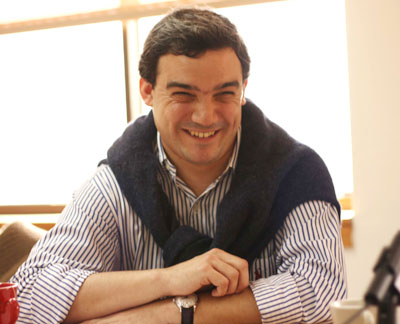
It’s unbelievable. I have never…before coming here I studied in the US, I studied in Italy – I studied in different countries and I never had that reaction from the local people. I was still surprised and I am still surprised. Every day I learn something from the Taiwanese and I’m surprised how they take care of relationships. It’s…if we are friends we are going to be friends probably forever until something really bad happens, maybe or somebody dies or…but it’s very different from our mindset in Argentina. People I have met four years ago they still write emails to me for Chinese New Year and say – we haven’t ever met again but they are still in touch and like “Everything OK? Let me know. My relatives are in Taiwan if you need anything they can help you.” It’s very, very unbelievable.
And, here, in the libraries. I run into some books that are photographic books comparing the last 50 years of Taiwan. And, you take a look at what was Taiwan like, in the 50’s, and what it’s now – we are talking about places that are in different planets because it’s – the transformation is unbelievable, it’s unbelievable. I cannot believe all the time they are building new things, that they’re investing a lot of infrastructure. It doesn’t matter who the party in power is they have policies that remain unaltered – and whoever is in power will still invest a lot in Education and still will invest a lot in infrastructure. It’s unbelievable. As Aaron said “It’s a success story!” And, I cannot say that its going to have a happy ending because it’s still going on. But, so far so good – it’s unbelievable. I’m still, like, very, very surprised about Taiwan.
What about NCCU before you came? So much different than what you expected.
Actually, that was one of the factors that made me choose Taiwan and not NCCU specifically, but Taiwan...because here most of the faculty, whatever university you check, most of the faculty have been trained abroad. They have got their degrees in the US or Europe or…especially in my field, in law. Almost everybody here has studied in Germany. It’s unbelievable. Specifically in Germany. They are Juris Doctors very prestigious German universities!
Yeah. That’s true. I think either Germany or Japan or the United Sates.
But – overseas. And that contributes a lot to make everything more international. And, it makes things a lot easier for foreign students here. I have had good experiences with professors; I have had classes that I didn’t like but I like the instructor but I didn’t like the topic. I have had a little bit of everything. But, in overall, the conclusion is good. And, I cannot believe that if I want a book that is not in the library all I have to do is ask the university to buy it. And, 45 days later I have the book! In my country that doesn’t exist – that’s just not the way it works. But, I’m happy here.
Sorry, we have just 6 minutes. How’s you classroom life? Your colleagues, your class…
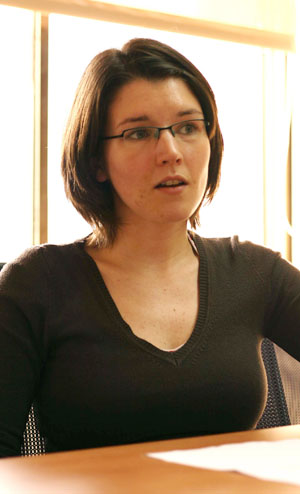
 I’ve been to mainland China; I lived in Hong Kong before for a year. I’ve been to Singapore and Malaysia and Indonesia...
I’ve been to mainland China; I lived in Hong Kong before for a year. I’ve been to Singapore and Malaysia and Indonesia...
Sabrina: I think in the IDAS classes, in my classes in our program, it’s very interesting because we have so many students that – every student comes from a different background, from different countries. Different…we even have different age groups and everything. So this…
What kind of different?
There are already-retired students. They already retired.
How old?
I think they’re…well, they are more than fifty. They are older than 50, yeah.
Sabrina: And then we have students that, yeah, that are much younger. And then we have students in the middle, and everything. So, and then, the different countries, different backgrounds and I think that makes it really interesting to study with these kind of people because everybody, yep, has different experiences and has different experiences to share in the classroom. So, this is the thing that I…
How many different backgrounds so far. Because you…
Aaron: Every continent - Africa, South America, North America, Europe, Asia All Over the Place, Australia …
Juan: A lot of diversity. Very, very diverse. Not only the origins but also the area of expertise.
Sabrina: Yeah, areas of expertise – that’s also [another good thing].
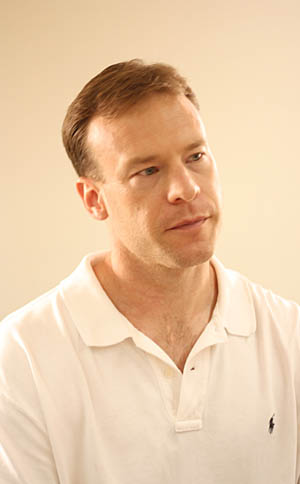
Aaron: Taiwanese professionals, these kind of classmates. And, when we socialize outside of class, we get to know them. You know, you can meet people in the government, in business and that’s where you learn a lot more. So, that’s another nice thing about the program.
Juan: And, on a personal note, I would like to say that my Taiwanese classmates are very quiet – just like my students. They don’t ask questions. It’s really hard to know if what you are saying is being understood or not. And…
They won’t say a word.
Juan: …they don’t say anything until the class is over and then you have all the questions. But its, It’s very interesting. I’m used to, to have to put my back against the white board and just answer as many questions as I can in Argentina. But, here, it’s very, very quiet.
Anything extra you want to let people know?
Juan: How easy and convenient life is in Taiwan. It’s like you have a bunch of people just thinking how to make everything easier for everybody. To pay the taxes, to pay the rent, to buy an airplane ticket from Taiwan to Italy at three in the morning – you can do everything here. It’s unbelievable. I have done it.
Tell me about the class make up, local students to international?
Juan: Oh, half, usually, roughly half Taiwanese and half foreign students. But that varies…
IDAS Faculty NCCU
|
Name |
Education |
Position |
Research Fields |
Courses |
|
George Washington University, Ph.D. |
Distinguished |
|
Public Sector Organizations: Performance in Comparative Context
|
|
|
London School of Economic and Political Science, Ph.D. |
Assistant Professor |
|
Seminar on Political Culture and Political Development in East Asia |
|
|
National Chengchi University, Ph.D. |
Associate Professor |
|
|
|
|
Purdue, Ph.D. |
Professor |
|
Cross-Strait Political and Economic Relations |
|
|
Leonardo Chu |
Southern Illinois University, Ph.D. |
Professor |
|
|
|
Southern Illinois University, Ph.D. |
Distinguished Professor |
|
Media and Globalization |
|
|
UCLA, Ph.D. |
Distinguished Professor |
|
East Asian Development Project |
|
|
Barry Fong |
University of Chicago, Ph. D |
Professor |
|
Development and Culture |
|
University of Hull, Ph.D. |
Professor |
|
Asia Pacific Security |
|
|
University of Maryland, Ph.D. |
Associate Professor |
|
Asia-Pacific Regional Development |
|
|
University of South Carolina, Ph.D. |
Associate Professor |
|
|
|
|
University of Texas at Austin, Ph.D. |
Professor |
|
Small and Medium Enterprise Management Seminar |
|
|
Ping-Yin Kuan |
University of Virginia, Ph.D. |
Associate Professor |
|
Introduction to Statistical Analysis
|
IMAS Faculty NCCU
|
Name |
Education |
Position |
Research Field |
Courses |
|
Ph.D., University of Pittsburgh |
Professor |
|
|
|
|
Ph. D., University of Pennsylvania |
Professor |
|
Spatial Development of Taiwan |
|
|
Ph. D., University of Chicago |
Professor |
|
|
|
|
Ph.D., Albert- Ldwigs- University |
Professor |
|
Taiwanese History |
|
|
Ph. D., Virginia Polytechnic Institute and State University |
Associate Professor |
|
Economic Development of Mainland China |
|
|
Jen-te Hwang |
Ph. D., New York University |
Professor |
|
|
|
David S. Blundell |
Ph.D., University of California, Los Angeles |
Professor |
|
Cultural Ethnic Structure of Taiwan |
|
Cheng-tian Kuo |
Ph.D.,University of Chicago |
Professor |
|
Political Development of Taiwan |
|
Ph.D. of Uralic and Altaic Studies, Indiana University, U.S.A of Texas at Austin |
Associate Professor |
|
|
|
|
Ph. D., Political Science, Southern Illinois University, U.S.A. |
Professor |
|
Political Development of Mainland China |
|
|
Ph.D., University of Virginia, Charlottesville |
Professor |
|
International Relations of Taiwan |
|
|
Ph.D., University of Southern California |
Professor |
|
State and Civil Society in Asian Countries |
|
|
Ding-shu Wang |
Ph. D., Georgetown University, USA |
Professor |
|
The Sina-Russia Relations |
|
Ph.D., University of Wisconsin -Madison, U.S.A |
Professor |
1. Party and Politics in the PRC 2. US-PRC Relations 3. Asia-Pacific Security
|
The Cross Strait Relationships between Mainland China and Taiwan |
|
|
Ming Lee |
Ph.D., University of Virginia, U.S.A. |
Professor |
1. North-East Asia Research 2. Cross-Strait Relations 3. International Conflicts and Crisis Management |
International Status of Mainland China |
|
Ph.D., Northwestern, U.S.A. |
Professor |
1. International Security and Conflict 2. International studies of Latin America 3. Research Method |
International Status of Mainland China |
|
|
Alex Chiang |
Ph.D., Michigan State, U.S.A |
Professor |
1. International Politics 2. Diplomacy and Consular Practice 3. Methodology of International Relations 4. Research Method |
Research Method |
|
Kuo-tsai Chao |
Ph. D., University of Edinburgh, U.K. |
Professor |
1. International Law 2. Law of International Organization 3. International Environmental Law |
International Law and Diplomacy |
|
Chan Kang |
Ph.D., Harvard University, U.S.A. |
Assistant Professor |
1. Chinese Philosophy 2. Political Philosophy |
Topics in Chinese Political Philosophy |


